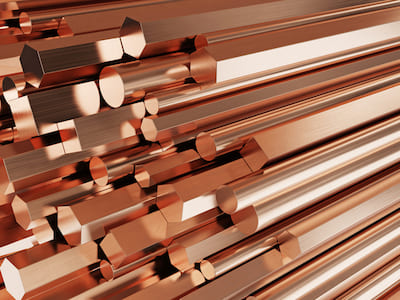How Copper Products Add To Sustainable Practices in Various Markets
Copper products are increasingly acknowledged for their considerable payments to lasting techniques throughout several sectors, driven by their intrinsic properties such as efficiency, recyclability, and sturdiness. In eco-friendly energy systems, for instance, copper boosts the functionality of solar and wind modern technologies, while its application in building decreases waste via longevity. The material's antimicrobial features supply encouraging advantages in medical care setups. As sectors seek to embrace even more lasting methods, the function of copper can show crucial in achieving ecological goals. What ramifications might this have for future innovations in sustainability?
Copper in Renewable Energy
Copper plays an important function in the innovation of renewable power innovations, functioning as an important conductor in different applications. Its outstanding electric conductivity and resistance to rust make it a suitable product for electrical circuitry, which is vital in solar panels, wind turbines, and power storage space systems. In solar photovoltaic or pv systems, copper is made use of in the affiliations and wiring, enabling reliable energy conversion from sunshine to power.
In wind power, copper is indispensable to the generators and transformers that transform kinetic energy into electrical power, making certain optimum performance and integrity. In addition, the need for electric vehicles (EVs) is increasing, with copper being a key element in batteries, electric motors, and billing infrastructure. The transition to EVs significantly enhances the need for copper, as these lorries usually use 4 times much more copper than conventional interior combustion engine vehicles.
As the globe seeks to alleviate environment modification and change to lasting power resources, copper's function comes to be significantly crucial. The product not only boosts the efficiency and resilience of renewable power systems but additionally sustains the more comprehensive objective of lowering greenhouse gas emissions and advertising a lasting future.
Eco-Friendly Building And Construction Materials
Recently, there has actually been a notable shift in the direction of the fostering of eco-friendly building and construction products in response to growing ecological concerns. This change is motivated by the need for sustainable choices that reduce ecological footprints while keeping architectural stability and visual charm.
Copper, understood for its durability and recyclability, has actually become a key gamer in this field. It can be used in roof, pipes, and electrical systems, adding to power performance and decreasing waste. Copper's durability suggests fewer replacements with time, more boosting its sustainability profile.
Additionally, materials such as bamboo, recovered wood, and reused steel are getting appeal. These choices not just provide minimized environmental influence but also promote resource preservation. As constructing codes progressively emphasize sustainability, contractors and designers are incorporating these products right into their tasks, cultivating development in layout.
The raising fostering of environmentally friendly building and construction materials mirrors a wider commitment to sustainability in the built setting. By prioritizing these materials, the building market can considerably lower its carbon impact, align with regulative standards, and sustain a healthier community for future generations. This pattern marks an essential action towards an extra lasting future in building.
Copper's Function in Healthcare
Recent research studies have actually highlighted the significant function of copper in healthcare setups, especially due to its antimicrobial residential properties. Copper surfaces have actually been revealed to decrease the visibility of pathogens, including microorganisms and infections, by up to 99.9% within a brief period. This impressive efficacy makes copper an important material for high-touch surfaces in health centers, such as doorknobs, bed rails, and IV poles, thereby adding to enhanced infection control procedures.
Along with its direct antimicrobial effects, copper additionally plays a function in the broader context of hospital sustainability (Copper Products). By including copper into medical equipment and home furnishings, medical care facilities can lower the occurrence of healthcare-associated infections (HAIs), which not just boosts patient results however also reduces the expenses related to extensive hospital remains and added therapies
Additionally, copper's sturdiness and recyclability straighten with lasting techniques, enabling for accountable resource administration. As healthcare systems progressively focus on both person security and environmental stewardship, the assimilation of copper products is becoming much more prevalent. This dual benefit emphasizes copper's vital payment to a much healthier, much safer, and more lasting medical care environment.
Sustainability in Transportation

Furthermore, copper's longevity and rust resistance add to the long life of transportation framework (Copper Products). In rail systems, for circumstances, copper components improve the reliability and effectiveness of signaling and power systems, necessary for reducing hold-ups and energy intake. In addition, copper's function in renewable resource systems, such as solar and wind, supports sustainable transportation remedies by offering tidy power for electrical transportation choices
Investments in copper technology not just foster sustainability yet also boost economic growth and job production in eco-friendly sectors. As sectors aim to fulfill rigorous environmental laws, the application of copper products in transportation arises as a critical approach in accomplishing sustainability objectives and promoting a cleaner, extra effective future.
Copper and Circular Economic Situation
As the globe significantly welcomes sustainability, the duty of copper in the round economic climate ends up being ever before more considerable. Copper's inherent buildings-- such as its recyclability, conductivity, and durability-- placement it as a key product in a resource-efficient economic climate. The round economy intends to lessen waste and make best use of source usage with recycling and reusing products, and copper master this regard.
The metal can be recycled forever without loss of top quality, making it an excellent prospect for lasting techniques across different markets, including construction, electronic devices, and renewable power. By reprocessing and recouping copper from end-of-life products, sectors can considerably minimize the requirement for virgin products, go right here therefore lowering environmental influences connected with mining and processing.
Furthermore, the combination of copper right into round economic situation frameworks not only preserves resources yet likewise promotes development. Services that focus on copper reusing contribute to an extra lasting supply chain, enhancing their competitiveness while lining up with regulatory demands and customer choices for ecologically accountable items.
Verdict
Finally, copper items dramatically contribute to sustainable practices across several markets. Their crucial role in enhancing renewable resource innovations, advertising environment-friendly construction products, supporting infection control in healthcare, helping with sustainable transport, and symbolizing the concepts of a round economic situation emphasizes the flexibility and value of copper. By integrating copper right into various applications, industries can attain greater performance, minimize environmental impact, and straighten with global sustainability objectives, ultimately promoting a more Full Report lasting future.

Copper's excellent conductivity makes it a recommended product in electrical automobile (EV) systems, enhancing energy performance and performance. Additionally, copper's duty in renewable energy systems, such as solar and wind, sustains sustainable transportation remedies by supplying tidy energy for electrical transportation choices.
Their essential role in boosting renewable energy technologies, promoting eco-friendly building and construction materials, sustaining infection control in medical care, helping with sustainable transport, and personifying the concepts of a round economic situation underscores the adaptability and importance of copper.
Comments on “The Ultimate Overview to Sustainable Living with Eco-Friendly Copper Products”